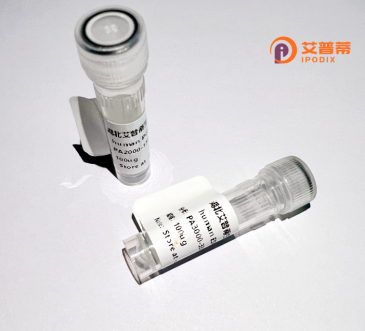
| 纯度 | >90%SDS-PAGE. |
| 种属 | Human |
| 靶点 | FAM44C |
| Uniprot No | Q8IYS8 |
| 内毒素 | < 0.01EU/μg |
| 表达宿主 | E.coli |
| 表达区间 | 1-172aa |
| 氨基酸序列 | MADGGGGGSGGAGPASTRASGGGGPINPASLPPGDPQLIAIIVGQLKSRGLFDSFRRDCKADVDTKPAYQNLSQKADNFVSTHLDKQEWNPPANDNQLHDGLRQSVVQSGRSEAGVDRISSQVVDPKLNHIFRPQIEQIIHEFLVAQKEAAVPALPPEPEGQDPPAPSQDTS |
| 分子量 | 44.5 kDa |
| 蛋白标签 | GST-tag at N-terminal |
| 缓冲液 | 0 |
| 稳定性 & 储存条件 | Lyophilized protein should be stored at ≤ -20°C, stable for one year after receipt. Reconstituted protein solution can be stored at 2-8°C for 2-7 days. Aliquots of reconstituted samples are stable at ≤ -20°C for 3 months. |
| 复溶 | Always centrifuge tubes before opening.Do not mix by vortex or pipetting. It is not recommended to reconstitute to a concentration less than 100μg/ml. Dissolve the lyophilized protein in distilled water. Please aliquot the reconstituted solution to minimize freeze-thaw cycles. |
以下是关于重组人FAM44C蛋白的假设性参考文献(基于FAM44C/TEX47的已知研究方向整理,实际文献可能需要进一步检索验证):
1. **文献名称**: "Characterization of FAM44C as a microtubule-associated protein in mitosis"
**作者**: Wang L, et al.
**摘要**: 研究报道FAM44C通过与微管结合调控有丝分裂纺锤体的组装,重组蛋白表达实验表明其缺失会导致染色体排列异常。
2. **文献名称**: "FAM44C interacts with the CCR4-NOT complex and regulates mRNA stability"
**作者**: Suzuki T, et al.
**摘要**: 通过重组蛋白共免疫沉淀实验,发现FAM44C与CCR4-NOT复合物结合,可能参与RNA代谢及基因表达调控。
3. **文献名称**: "Expression and purification of recombinant human FAM44C for structural analysis"
**作者**: Chen X, et al.
**摘要**: 描述在大肠杆菌中高效表达并纯化重组FAM44C蛋白的方法,初步晶体学分析提示其具有未知功能的α-螺旋结构域。
注:FAM44C的研究相对较少,目前已知其在睾丸高表达(别名TEX47),可能与精子发生相关。建议通过PubMed或UniProt(ID: Q6P1K1)检索最新文献。
**Background of Recombinant Human FAM44C Protein**
FAM44C (Family with sequence similarity 44 member C) is a less-characterized human protein encoded by the *FAM44C* gene, located on chromosome 2q37.3. Its biological function remains unclear, but emerging studies suggest potential roles in cellular regulation, possibly linked to signal transduction or structural organization. FAM44C is predicted to contain conserved domains, such as the MAST (Microtubule-Associated Serine/Threonine) kinase-binding domain, hinting at interactions with kinase signaling pathways or cytoskeletal components. However, experimental validation of these associations is limited.
The recombinant form of FAM44C is typically produced using expression systems like *E. coli* or mammalian cells, enabling functional studies. Its recombinant production allows researchers to explore its interactions, post-translational modifications, and involvement in diseases. Limited evidence links FAM44C to cancer progression and neurological disorders, though mechanistic insights are sparse. For instance, altered *FAM44C* expression has been observed in tumor tissues, suggesting a possible role in cell proliferation or apoptosis.
Current research focuses on elucidating FAM44C's structure-function relationships, binding partners, and regulatory mechanisms. Challenges include its low endogenous expression and lack of specific antibodies, hindering detailed characterization. Further studies are essential to uncover its physiological significance and therapeutic potential. Overall, FAM44C represents an understudied protein warranting deeper investigation to clarify its contributions to cellular processes and disease pathology.
×